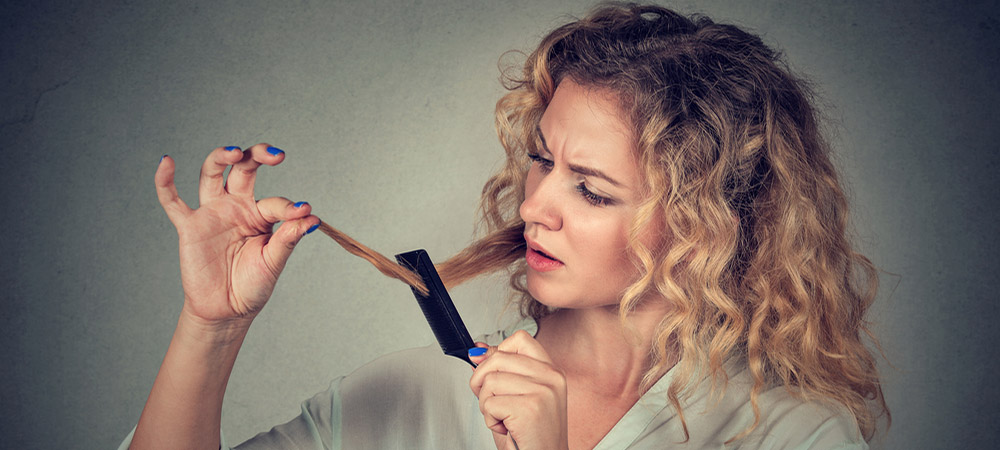Last Updated on July 10, 2023
Hair is a crucial aspect of our identity and self-expression. However, for those affected by alopecia areata, hair loss becomes a daily struggle. Alopecia areata is an autoimmune condition that targets hair follicles, leading to hair loss in varying degrees. The purpose of this blog is to dissect alopecia areata and explore alopecia areata self-care steps and treatment options. Moreover, we will look into the prevalence of this condition, emphasizing the significance of raising awareness and supporting individuals living with alopecia areata.
Understanding Alopecia Areata
Alopecia areata is a disorder where the immune system starts to attack hair follicles, causing hair loss. The condition presents as round or oval hairless patches on the scalp. However, Alopecia can also affect eyebrows, eyelashes, and other body hair. In some cases, alopecia areata progresses to alopecia totalis, which is the complete loss of scalp hair, or alopecia universalis, which is the loss of all body hair.
The Prevalence of Alopecia Areata
Alopecia areata affects individuals of all ages, genders, and ethnic backgrounds estimating approximately 2% of the global population at some point in their lives. The stats equate to millions of people worldwide grappling with the challenges of this condition.
Prevalence among Children and Adolescents
Alopecia areata often manifests during childhood or adolescence. Research suggests that about 60% of individuals with alopecia areata develop symptoms before 20 years of age. Moreover, the impact on self-esteem and social interactions during developmental stages becomes challenging for young individuals.
Understanding Alopecia Areata Self-Care
When dealing with alopecia, you should avoid certain actions or habits that can potentially worsen the condition or negatively impact your overall well-being. Here are some things to avoid when you have alopecia. Some of the steps for alopecia areata self-care include:
Stress
We understand the stress of losing hair, but stress can trigger or exacerbate alopecia symptoms. Try to manage stress levels through relaxation techniques, exercise, therapy, or other stress-reducing activities.
Harsh hair treatments
 When aiming for alopecia areata self-care avoid frequent hair treatment. Chemicals can irritate the follicles. Avoid harsh chemical treatments, excessive heat styling, and tight hairstyles that pull on the hair follicles. These can further damage the hair and contribute to hair loss.
When aiming for alopecia areata self-care avoid frequent hair treatment. Chemicals can irritate the follicles. Avoid harsh chemical treatments, excessive heat styling, and tight hairstyles that pull on the hair follicles. These can further damage the hair and contribute to hair loss.
Wearing wigs or hairpieces that irritate
While wigs can help boost confidence and conceal hair loss, it’s crucial in alopecia areata self-care to choose hairpieces made from breathable materials. Avoid wearing anything that causes irritation or exacerbates the condition.
Overusing hair products
Hair products like gels, sprays, and styling mousses contain harsh chemicals that may irritate the scalp. Limit their use and opt for milder, natural alternatives amongst alopecia areata self-care.
Self-isolation and social withdrawal
Alopecia can affect self-esteem and confidence, leading to feelings of self-consciousness. However, isolation contributes to emotional distress. Engage in social activities, seek support from friends and family, and consider joining alopecia support groups to connect with others who understand your experiences.
Avoiding Unverified Treatments, Adapting Alopecia Areata Self-Care
Dubious treatments can cause more harm than benefit. Be cautious of unverified treatments or miracle cures for alopecia. Consult with medical professionals, such as dermatologists or trichologists, who specialize in hair and scalp conditions. Choose wisely.
Neglecting overall health
Maintaining good health is essential if you suffer from Alopecia Areata. Avoid neglecting your general well-being and focus on a healthy and balanced diet, regular exercise, and sufficient sleep. These factors contribute to healthy hair growth and make alopecia areata self-care effective.
Alopecia Areata Self-care Treatment
Alopecia Areata can be managed by self-care practices to help promote hair regrowth. Here are some self-care treatments that individuals with alopecia areata should consider:
Gentle hair care
Treat your hair and scalp with care to minimize further damage. Use a mild, sulfate-free shampoo and conditioner. Avoiding excessive brushing or combing, and opting for wide-toothed combs or brushes with soft bristles all contribute to alopecia areata self-care.
Scalp massage
Scalp massages help stimulate blood circulation and promote hair growth. Every day, softly rub your scalp using the tips of your fingers for a couple of minutes.
A balanced diet
 Maintaining a nutritious and balanced diet supports the immune system, preventing further damage to hair follicles. Moreover. Ensure you’re getting enough vitamins, minerals, and proteins by including a variety of fruits, vegetables, lean proteins, and whole grains in your meals.
Maintaining a nutritious and balanced diet supports the immune system, preventing further damage to hair follicles. Moreover. Ensure you’re getting enough vitamins, minerals, and proteins by including a variety of fruits, vegetables, lean proteins, and whole grains in your meals.
Stress management
Stress can exacerbate alopecia areata, so finding healthy ways to manage stress is important. Engage in activities that help you relax and reduce stress, such as exercise, yoga, meditation, or hobbies you enjoy.
Protect your scalp from the sun
When spending time outdoors, protect your scalp from harmful sun exposure by wearing a hat. Applying sunscreen specifically designed for the scalp contributes to alopecia areata self-care.
Consider scalp treatments
Some individuals find benefit from over-the-counter or prescription topical treatments that are applied directly to the scalp. These may include corticosteroid creams, ointments, or foams. However, it’s important to consult with a dermatologist who can guide you on the appropriate treatment options.
Support and counseling
Dealing with alopecia areata can be emotionally challenging. Seeking support from friends, family, or support groups can provide a sense of community and understanding. Additionally, consider seeking counseling or therapy to help cope with any emotional distress or self-esteem issues related to hair loss.
Things to Avoid When You Have Alopecia Areata
There are certain things you may want to avoid to help you with alopecia areata self-care regime. Here are some things to consider.
Trauma to the scalp
Physical trauma, such as excessive rubbing, scratching, or picking at the affected areas, can potentially worsen alopecia areata. Avoid actions that may irritate or harm the scalp.
Wearing tight headgear
Avoid wearing hats, caps, or headgear that are too tight or cause friction on the scalp. Opt for loose-fitting headwear made from breathable materials to minimize irritation.
Chemical irritants
Some hair care products or ingredients can cause scalp irritation or trigger allergic reactions, potentially exacerbating alopecia areata. Avoid products with harsh chemicals or fragrances that may irritate the scalp. Consider opting for gentle, hypoallergenic, or natural hair care alternatives.
Excessive sun exposure
Protect your scalp from excessive sun exposure, as the skin may be more sensitive in areas affected by alopecia areata. Wear a hat or apply sunscreen specifically designed for the scalp when spending time outdoors.
Smoking
Smoking is known to have negative effects on overall health, including hair health. It can reduce blood flow to the hair follicles, potentially impacting hair growth. If you are a smoker, contemplate the idea of quitting or decreasing your tobacco consumption.
Ways to Stop Alopecia Areata from Spreading
There are several ways to prevent alopecia from spreading and promote alopecia areata self-care. However, some alopecia areata self-care steps that may help reduce the chances of alopecia areata spreading include:
Early intervention
Seeking medical attention as soon as you notice signs of alopecia areata, such as patchy hair loss. Early treatment may increase the likelihood of halting or slowing down the condition’s progression.
Medical treatment
Consult with a dermatologist who specializes in hair and scalp disorders. They may recommend treatment options such as corticosteroid injections, topical corticosteroids, topical minoxidil, or other immunomodulatory therapies to help suppress the autoimmune response and reduce inflammation.
Avoid triggers
Discuss and identify and try to avoid potential triggers that may worsen or activate alopecia areata. While triggers can vary for each individual, some common factors include stress, certain medications, and trauma to the skin or scalp. Keeping a log book helps with identifying and avoiding your triggers.
Protect the affected areas
Protect the areas of hair loss from further damage or irritation. Avoid excessive friction, harsh hair treatments, and tight hairstyles that pull on the remaining hair. Be gentle when washing or styling your hair.
Stress management
Stress is believed to be a contributing factor to alopecia areata. Incorporate stress-reducing techniques into your routine, such as regular exercise, relaxation exercises, mindfulness, or seeking support from a therapist or support group.
A balanced diet and healthy lifestyle
Maintain a balanced diet rich in vitamins, minerals, and antioxidants to support overall health, including the health of your hair and immune system. Ensure you’re getting adequate sleep, managing any underlying health conditions, and avoiding unhealthy habits like smoking.
Regular follow-ups
Maintain regular follow-up appointments with your dermatologist to monitor the progression of your alopecia areata and adjust the treatment plan as necessary.
Conclusion
In conclusion, by adopting gentle hair care routines, managing stress levels, maintaining a balanced diet, and seeking support from healthcare professionals individuals with alopecia areata can proactively manage the condition. It’s important to remember that alopecia areata self-care practices may vary in effectiveness for each individual. Moreover, consulting with a dermatologist or healthcare professional is crucial for personalized advice, diagnosis, and treatment options. Moreover, by taking an active role in alopecia areata self-care treatment, individuals can enhance their quality of life and nurture positivity in their surroundings. Learn more about the condition and how clinical trials can help with Alopecia Areata.
Also read ….
